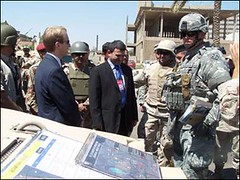Multi-National Force – Iraq Press Release
BAGHDAD — Gauging the progress of security, reconstruction and governance efforts in Iraq is a challenge unto itself, U.S. officials said Tuesday. While in Baghdad senior U.S., Iraqi and Coalition leaders discussed signs of improved security in the capital’s Adhamiyah district, in Washington Pentagon officials stressed the importance of recognizing that security conditions in Iraq vary widely by region.
On Sunday, the Baghdad provincial chairman, accompanied by the deputy chief of mission for the U.S. Embassy and the deputy commanding general for Multi-National Division – Baghdad, visited the recently cleared district of Adhamiyah for the first time since the start of Operation Together Forward to see the progress being made in securing Baghdad.
Mu'een Hameed Abd al-Majed, along with Amb. Daniel Speckhard and Brig. Gen. David Halverson, walked the streets of the district, talking to local residents about the need for essential services and improved security. {Click on image for photo details}

1 comment:
The trip culminated at the Adhamiyah District Advisory Council, where the officials discussed with the council leadership specific quality of life projects recently undertaken in the neighborhood. Those economic and reconstruction gains were made possible by the reduction in violence.
Iraqi Army and Police, supported by MND-B Soldiers, secured the area in August and made way for the introduction of badly needed essential services. The security plan is an Iraqi-led endeavor to reduce murders and kidnappings in areas identified by frequent incidents of sectarian violence.
And while operations in Adhamiyah have generated good news on the security front, Pentagon officials said on Tuesday it is important to keep in mind that conditions in Iraq cannot be adequately described in the blanket statements sometimes seen emerging from the media. Rather, they explained different areas of the country display vastly different trends in unity, security, stability and prosperity, and no discussion of one factor can be taken out of context of the others.
Reinforcing the necessity of context, the commander of the 1st Marine Expeditionary Force and Multi-National Force – West, Maj. Gen. Richard Zilmer, on Tuesday challenged recent stories in the press which have painted a bleak picture of the security situation in western Iraq’s al-Anbar province.
The stories referenced a classified Marine assessment of the state of the insurgency in Anbar.
“(The reports) fail to accurately capture the entirety and complexity of the current situation,” Zilmer said in a written statement.
“The classified assessment which has been referred to in these reports was intended to focus on the causes of the insurgency,” he said. “It was not intended to address the positive effects Coalition and Iraqi forces have achieved on the security environment over the past years.”
Pentagon spokesman Bryan Whitman called the security situation in Iraq uneven.
“There are places where it is relative stability, where the military and police working side by side have created conditions that are stable,” he said. “There are some places in Iraq that are much more of a challenge.”
Security is just one part of the equation, Whitman explained. Governance, economic conditions, infrastructure reconstruction and the political situation are all important factors in gauging Iraq’s progress.
“All these factors are interrelated to create an environment in which Iraqis feel they have hope and look towards a brighter future,” he said.
Al-Anbar province, a Sunni-dominated area that extends from just east of Fallujah to the Jordanian and Syrian borders, is Iraq’s largest in terms of size, but is sparsely populated.
Building up Iraqi security forces in the province has not been as straight forward there as it has in other parts of Iraq, Marine officials said. Navigating the network and culture of powerful Sunni tribal leaders has proved challenging in many areas of the province.
Similarly, building a provincial government has been tough in the region.
“The Iraqi government is working very hard to improve not only the national government, but to make local governments strong and able to meet the needs of the population,” Whitman said.
Zilmer said much progress has been made in securing Anbar, but “for lasting progress to take place, comparably effective advances must be made in the development of governmental and economic institutions at the local, provincial and national levels.
“Only then,” he said, “will the people of Anbar be able to realize their goal of long-term security, prosperity and confidence in their government.”
Post a Comment